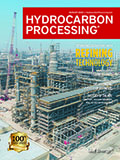
August 2022
Special Focus: Refining Technology
The challenge of frequent plugging in vent gas scrubbers is resolved with the highest degree of maleic anhydride (MAN) product recovery.
As the gavel dropped, signaling a historic agreement at the conclusion of COP26 (2021 United Nations Climate Change Conference) in Glasgow, Scotland, leaders from 197 nations agreed to continue supporting the goal of limiting global warming to 1.5°C above pre-industrial levels. The race is on!
Many factors go into selecting the proper regulator for your system. One of those factors is sensitivity to changes in outlet pressure as downstream flow fluctuates, which is often characterized as “droop” as illustrated within a regulator’s flow curve.
The energy transition requires rebuilding the energy supply infrastructure for a lower-carbon economy and renewable energy generation for industry and transportation that run more on electricity and hydrogen and less on fossil fuels and provide a circular path for consumer plastics. The growth in global oil demand is predicted to end within 10 yr, but it is still too early to foresee a rapid decline in that demand.
Catalysts
Hydrogen (H<sub>2</sub>) reforming is a process to produce H2 from a compound composed of H<sub>2</sub> atoms. A convection pass is used to heat the process during reforming, which creates nitrogen oxides (NO<sub>x</sub>). The NO<sub>x</sub>-rich flue gas passes through a selective catalytic reduction (SCR) reactor before being exhausted into the atmosphere.
Hydroprocessing (hydrotreating and hydrocracking) units are high-pressure, high-temperature units that have multiple reactors, multiple beds per reactor and specialized metallurgy. Catalysts in these units are replaced on a 2 yr–5 yr cycle, depending on feed quality, unit design, catalyst selection, operational constraints and performance.
100th Anniversary
Much like several initiatives passed in the 1970s and 1980s, the 1990s were a decade heavily focused on environmental issues, with many new regulations being enacted to not only mitigate industrial and vehicle emissions but also to advance the production of clean fuels globally.
The future is best described in three phases: Drivers for change, current responses and projections.
Bonus Report: Gas Processing & LNG Industry Spotlight
As companies across markets set aggressive decarbonization goals and sustainability commitments to align with changing regulations and consumer demands for greener energy and fuel, the liquefied natural gas (LNG) industry is searching for ways to lower emissions.
Disruptions of global hydrocarbon supply chains have increased the importance of liquefied natural gas (LNG), causing larger numbers of buyers and sellers to consider it for satisfying energy demand. For some, this is unfamiliar territory, requiring greater knowledge of the technologies and practices involved, as billions of dollars will be changing hands.
Many oil and gas industry applications face space constraints. This limitation requires more compact solutions providing the same performance as traditional alternatives, and this is particularly true in many valve installations, where actuators often require an inordinate amount of space.
Plant Design, Engineering, Construction and Commissioning
The startup and commissioning of hydrocarbon plants can present unique challenges that, if not anticipated and addressed in the pre-commissioning and commissioning periods, will inhibit plant startup and increase the difficulty of achieving product specifications in a timely manner.
Quality control (QC) is fundamental for capital project success. It should be an integral part of how construction is executed. Compliance to project requirements (e.g., drawings, specifications and standards) can be verified through this process.
Heat Transfer
Air-cooled heat exchangers are widely used in the petroleum, petrochemical, natural gas and other industries for cooling purposes. In contrast to a water-cooled system, which consists of a traditional shell-and-tube heat exchanger and a cooling tower, an air-cooled heat exchanger uses ambient air as the main cooling medium.
Maintenance and Reliability
The state of understanding science and facts on one side and distinguishing these from anecdotes and often far-fetched opinions on the other side should be concerning to us. Institutions of higher learning can be disinclined to teach needed, applicable or actionable knowledge.
The hydrogen (H<sub>2</sub>) plant in a refinery produces high-purity (99.9+ vol%) H<sub>2</sub> products using a licensed pressure swing adsorption (PSA) purification process to fulfill the H<sub>2</sub> makeup needs of refinery hydroprocessing facilities.
Columns
As detailed in <i>Hydrocarbon Processing’s</i> History of the HPI series, the modern oil refining industry traces its origin back nearly 170 yr. The industry has not only propelled much of the world to a higher standard of living, but has also created new products and technologies that have extended life expectancies, created modern societies and lifesaving equipment, and revolutionized the way people travel and communicate.
<i>Hydrocarbon Processing </i> sat down with Jason Urso (JU), Chief Technology Officer, Honeywell Process Solutions, to discuss the current state of the process automation industry, how new technologies are enhancing efficiency and safety, and what the future holds for automation.
Trends and Resources
In late September, <i>Hydrocarbon Processing</i> will again host the International Refining and Petrochemical Conference (IRPC) as an in-person event—the technical symposium has been held virtually since early 2021.
Information technology (IT) and operational technology (OT) environments have traditionally assumed distinct roles in industrial organizations. Separated both in purpose and in practice, IT and OT also differ in their culture and their norms around security and efficiency.

- INEOS receives €300-million grant to rejuvenate and decarbonize its Lavera plant 2/19
- AGC Vinythai commissions expanded chlor-alkali plant and e-BiTAC electrolyzers from thyssenkrupp nucera 2/19
- BASF launches AdBlue GE (green electricity) to decarbonize mobility value chain 2/19
- Carbon Neutral Fuels select Johnson Matthey, bp and Honeywell UOP technologies for UK SAF plant 2/19
- ExxonMobil starts operations on second carbon capture project in Louisiana (U.S.) 2/19
- Pall introduces two new technologies to reduce CAPEX and TCO in oil and gas processing 2/19




